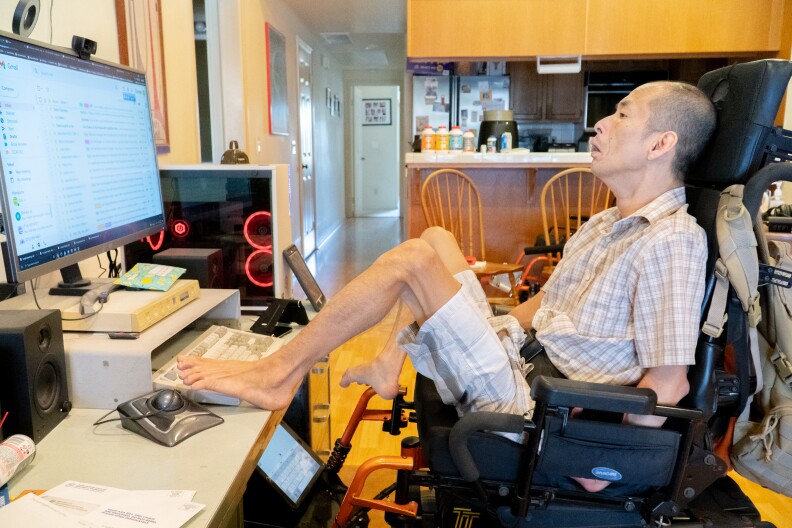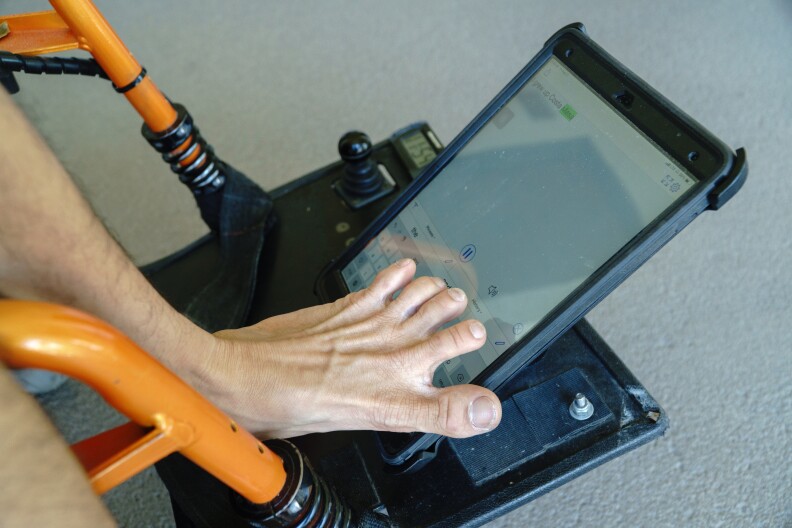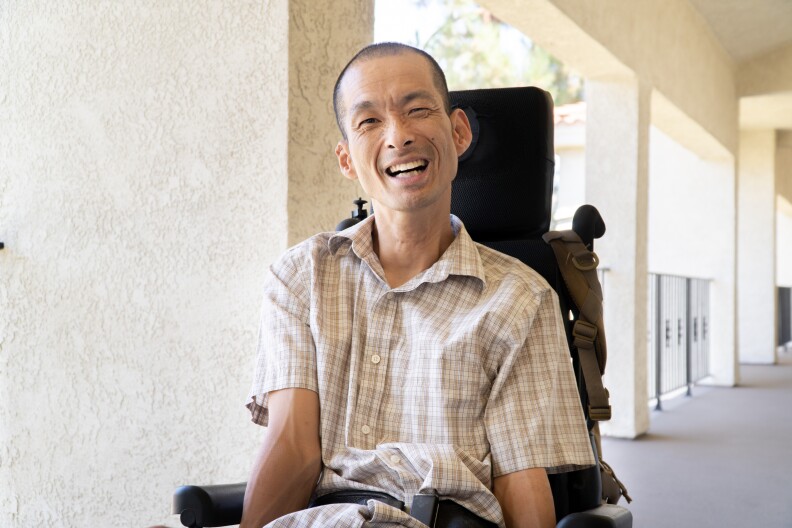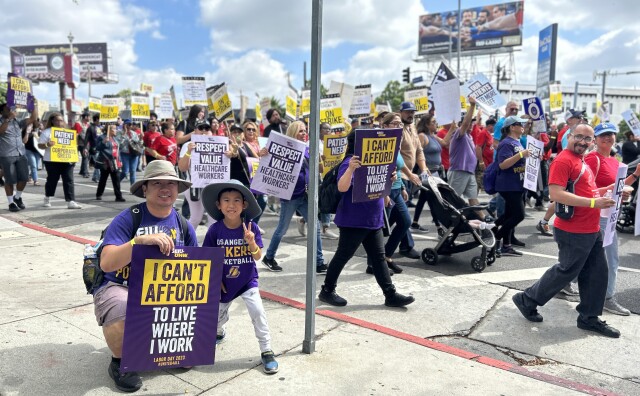People With Developmental Disabilities Want Their Home Health Workers Vaccinated

The end of September is the deadline for a slew of California health workers in hospitals, clinics, nursing homes and adult day care centers to get a coronavirus vaccine.
Even though they do much of the same intimate work, in-home health aides, who are paid for through the state’s regional center network, are not included on that list. That has angered people with intellectual and developmental disabilities such as Tim Jin, who receive services through regional centers and want the mandate expanded.
“When the agency sends me a new worker to help me, the first thing I ask is if they are vaccinated, and we go from there, but there is always a risk,” Jin said.

Even though he got vaccinated three months ago, Jin doesn’t feel safe in his own home. He wants everyone who comes through his front door to be vaccinated. But he doesn’t get that choice.

Jin has cerebral palsy, and doesn’t have the use of his arms or hands. He communicates mainly by typing out sentences with his toes on an iPad, which is mounted next to his feet on his electric wheelchair.
Jin is 46 and has lived independently in an Orange County apartment for 20 years. He types and opens doors with his feet, but needs help with everyday tasks such as eating and getting dressed. Up to six health aides come in and out of his home every day.
“Due to my disability I cannot do anything like cooking, eating, using the restroom, or even using the microwave on my own. I am totally dependent on others to assist me,” Jin said.
If an aide isn’t vaccinated, Jin asks them to wear a mask. But, he says, you can’t socially distance from the person brushing your teeth.
“The staff who come into my home should be vaccinated. It's that simple,” he said. "It's a matter of life and death.”

Who Will The Mandate Protect?
In August, California issued a health order requiring people who work in hospitals, nursing homes and adult day care centers to be vaccinated by the end of September unless they file a religious or medical exemption form. Throughout the pandemic, these congregate care settings have experienced thousands of outbreaks and deaths, driven in large part by unvaccinated staff.
Studies show that people with intellectual and developmental disabilities often have underlying health conditions that make them more susceptible to COVID-19. In California, 89% of them live with their families or on their own, meaning the coronavirus vaccine mandate covers just 11% of the 376,000 people with developmental disabilities in the state.
“If you have an intellectual disability, and you're living in your own home or a family home, you're doing better than those living in a congregate setting. However, you still have some increased risk compared to the general population,” said Scott Landes, an associate professor of sociology at Syracuse University's Maxwell School of Citizenship and Public Affairs.
“And when they do get diagnosed with COVID-19," he added, "they are about two to three times more likely to die from the disease."
Landes said cases seem to be dependent on two variables: pre-existing conditions, and the amount of in-person intimate care that the developmentally disabled person needs.
“Which really just makes sense for COVID,” he said. “If you've got a caregiver that's right up next to you, all day, it's going to increase the chances that you could get the disease.”
Low Wages For Workers Increase COVID-19 Risk To Developmentally Disabled
There are no licensing requirements for either the agencies or their staff. The state provides funding for the workers, but most earn little more than minimum wage. That low pay makes multiple jobs a necessity for many workers, increasing the risk of people with intellectual or developmental disabilities getting COVID-19, Landes said.
“A lot of the direct service providers who provide care for people with intellectual and developmental disability are working in situations where they're underpaid," he said. "And because of that, are having to sometimes work two and three jobs to make ends meet, which becomes another risk factor for those receiving services because you're a caregiver coming into your home.”
Low pay also makes it hard to retain workers, said Lori Shepard, director of operations at Avenues Supportive Living Services, an agency based in Valencia that provides in-home health aides to people with developmental disabilities.
“Almost all of our staff work for similar companies in order to just pay the rent, because we all have to pay such poor wages,” she said.
Shepard doesn’t know how many of her staff are vaccinated, and she doesn’t require weekly COVID-19 tests. She is opposed to a vaccine mandate because she fears the policy will exacerbate an already severe staffing crisis.
“If it becomes mandated we would definitely lose 20% of our workforce,” she said. “And then what’s next? Mandating the boosters. And if that happens, we're going to lose another 50% on top of it, because very few of my staff are saying that they are looking forward to or even considering getting the booster."
Shepard says her agency would stay open, but it could leave others understaffed and put their clients at risk. Landes shares her concerns.
“I just fear that if you put [a vaccine mandate] in place, you could go from staffing crisis to staffing catastrophe,” he said.
Not Waiting For The State
When asked if in-home care workers will be included in the vaccine mandate, the California Department of Public Health would only say it will continue to monitor the situation.
Without a state mandate it’s up to individual employers such as Debbi Davis, who felt she had no choice but to require her employees to get vaccinated. She is the director of Special Care Services in Solano County, which specializes in providing care for medically fragile developmentally disabled people.
“It’s our job to protect the vulnerable people we serve," Davis said. "I knew from the beginning that it was going to be a mandate to work for our company and I have not gotten the pushback the way I expected. A lot of people wanted to wait, and that's fair."
Davis already requires the flu shot as a condition of employment every year. To give her workers time to get used to the idea, she told them in June that they would need to get the coronavirus vaccine by Sept. 1.
As a registered nurse she spent months fielding questions from staff.
“It's like stepping off the plank and hoping you can swim, because I didn't know how people would react," Davis said. "But luckily it worked out."
She took calls and texts from her employees who didn’t want to ask vaccine questions in a public forum such as a company Zoom meeting.
“I literally spend hours and hours and hours doing research with the CDC website and sharing it with them. And I think that was helpful because people could ask me whatever they wanted to ask me and it wasn’t a dumb question,” she said.
Out of her 80 employees who provide home caregiving services, just one chose to leave the job rather than get vaccinated. Davis said her clients and their families are thrilled.
“We can be confident in saying that it's 100% compliance, which feels really good,” she said.
Davis would like to see guidance from the state health department and a vaccine mandate. Without it, she says “we’re all just figuring it out on our own.”
-
A medical industry challenge to a $25 minimum wage ordinance in one Southern California city suggests health workers statewide could face layoffs and reductions in hours and benefits under a state law set to begin phasing in in June. Some experts are skeptical, however, that it will have such effects.
-
Charlotte Maya's memoir, "Sushi Tuesdays: A Memoir of Love, Loss, and Family Resilience" is an intimate looks at how she continues to navigate her husband's suicide.
-
Fentanyl and other drugs fuel record deaths among people experiencing homelessness in L.A. County. From 2019 to 2021, deaths jumped 70% to more than 2,200 in a single year.
-
Prosecutors say Stephan Gevorkian's patients include people with cancer. He faces five felony counts of practicing medicine without a certification.
-
April Valentine died at Centinela Hospital. Her daughter was born by emergency C-section. She'd gone into the pregnancy with a plan, knowing Black mothers like herself were at higher risk.
-
Before navigating domestic life in the United States, AAPI immigrants often navigated difficult lives in their motherlands, dealing with everything from poverty to war.








